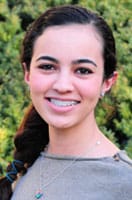Kheira Benkreira ’14: A Student Perspective
Kheira Benkreira ’14: A Student Perspective
by Jason H. Pier ’08, ’11 MA

Kheira Benkreira ’14
Trinity sophomore Kheira Benkreira was born in Algeria and moved to the United States when she was 3. Most of her family members still lives in Algeria and she visits them every two years. When she speaks of it, she refers to Algeria as “my country.” She gave a first-hand account of her memories of and feelings about Algeria through her many visits.
Algeria is the second-largest country in Africa, mostly covered by the Sahara Desert, with 35 million residents who live mainly on the Mediterranean coast. When asked about Algeria, Benkreira said, “Algeria is already pretty free,” compared to Saudi Arabia or Iran, and talked of how she wanted to be a doctor or a movie star when she was young. But stories she told reveal more about life in Algeria and how different it is from the U.S.
During Benkreira’s early years, Algeria was amidst a civil war. Because she was born during the day, her mother had no problem being driven from their family’s house in Arzew to the hospital in Oran, about 20 miles away. But when her mother went into labor at night with Benkreira’s younger brother, she had to walk to a local midwife as it was not safe for her to get to a hospital due to the civil conflict.
She remembers watching the Arab-Palestinian conflict on television at her grandmother’s house when she was 4 or 5, covered from the Muslim perspective showing what she described as atrocities toward the Palestinians from the Israelis. This event stuck in Benkreira’s mind and is responsible for setting her on the course to study international affairs, with a particular interest in humanitarian efforts in the Middle East.
Other examples she mentions show obvious differences between Algeria and the United States. Her mother has an international driver’s license and is routinely pulled over by the police there because she is a woman driving, but she continues to drive. When Benkreira goes swimming, she does not wear a bikini as she does in the U.S. because men holler and harass her; instead, she wears a shirt and shorts. She sometimes covers her clothes with an abaya, a long dress, while going between family homes, and takes the abaya off once she arrives.
Benkreira last visited Algeria during the summer of 2010, before the Arab Spring began with the Tunisian uprising in December of 2010 and a protest that killed five people in January 2011. Most of the protests have taken place in Algiers, the capital city about a four-and-a-half hour drive from where her family lives. On February 12, 2011, protestors in Algiers were stopped by riot police; they were asking for similar changes that led to an overthrow of the Egyptian and Tunisian governments earlier. The high price of food, lack of jobs and autocratic governments link these three countries and their protestors.
When asked to predict a future, post-Arab Spring Algeria, Benkreira said, “I don’t think it will be that different when I go back. I’m just as likely to visit next year.” She describes the Algeria of 2010 as a place where women walk around at night accompanied only by an older aunt; they don’t need to be accompanied by a man. “In my country there are bars on the windows everywhere. It began as a security issue and is now part fashion and part security.”
“The Spring hasn’t affected my family too much,” said Benkreira. But her family knows the effects of the high price of food and lack of jobs. “There are no jobs. Everyone has a specialty – the butcher, the baker. If there were no money, they would just trade. People just give up.” People resort to stealing to feed their families. Theft is very common. “You can’t wear earrings, jewelry, carry a phone, or anything like that in the cities.”
Healthcare is another big issue in her family. “Many men and women get lung cancer because as you drive around the town where I’m from, all you see is the smoke from petroleum refineries. My aunt was diagnosed with breast cancer. My grandmother has bad asthma. My family has a lot of health issues to deal with; however, the government is pretty helpful when it comes to paying the costs of addressing the issues.”
When asked if a larger overthrow was on the horizon, Benkreira said, “Yes, if the government doesn’t make adjustments or help their people, it is going to have to watch out. If food prices keep going up the people will not be left with any choice but to revolt…to fight. It is going to cause a lot of unrest.” She continued, “You can only simmer people down for so long, so it won’t surprise me,” if another uprising does occur eventually. “After seeing their whole families struggle to find jobs, people in Algeria just give up. My mother gave up on college. My cousin just gave up on school and became a hairdresser,” because she did not expect to be able to find a better job even with a college degree.
Benkreira concluded, “No nation is perfect – modifications are always needed, and Algeria is no exception. I urge fellow Algerians to speak up and be heard, and I urge the Algerian government to address ongoing issues immediately. Illusions of promised reform will only fool the people so many times.”